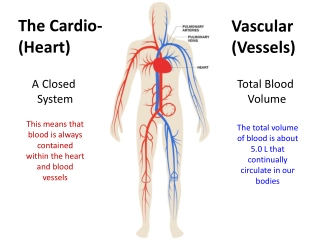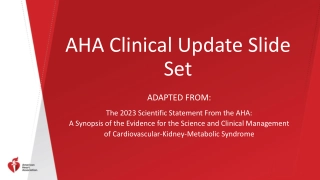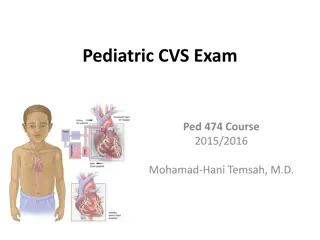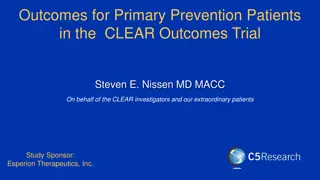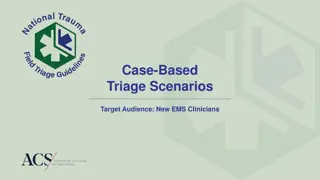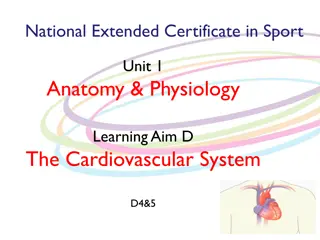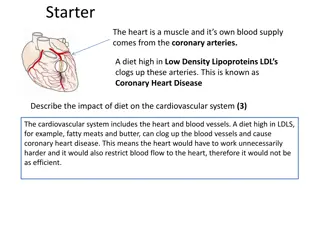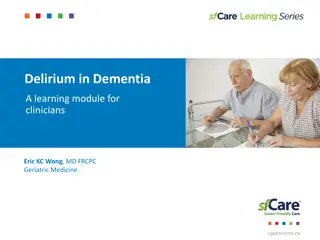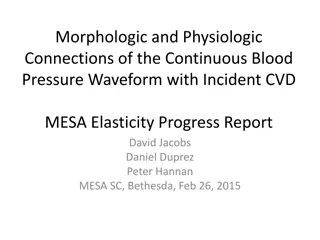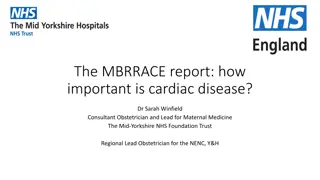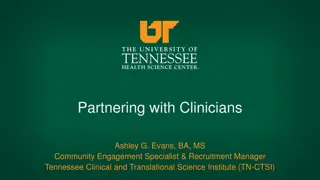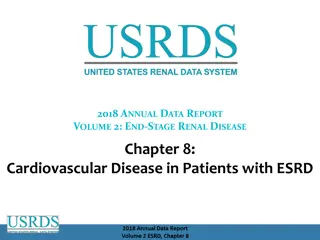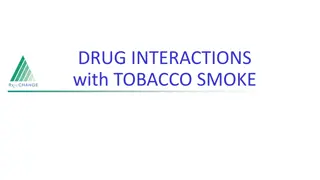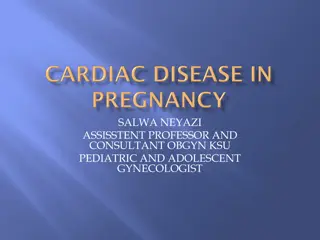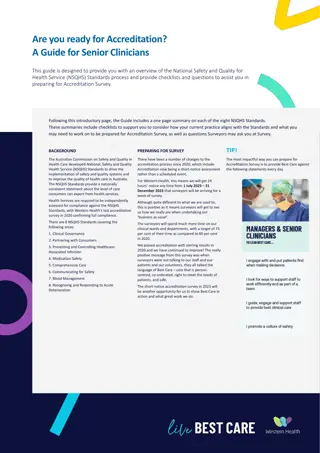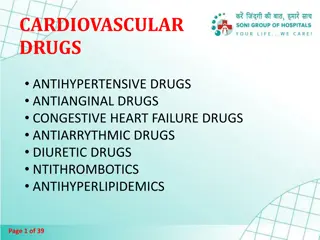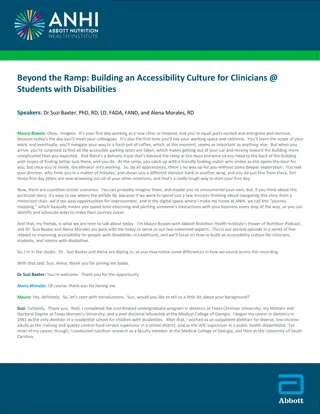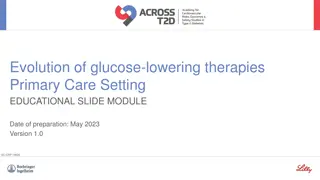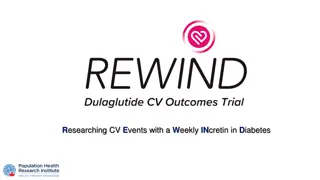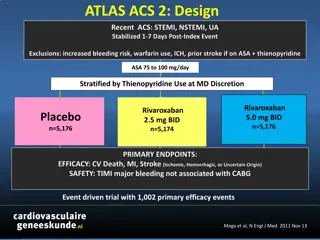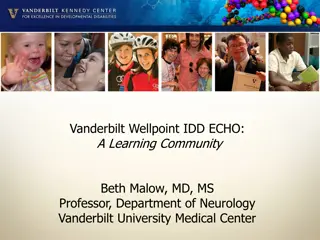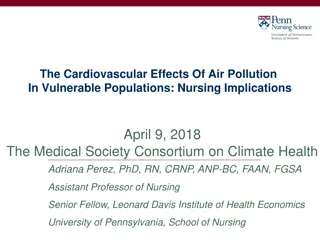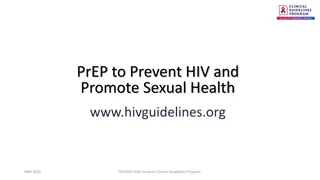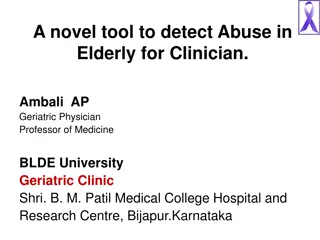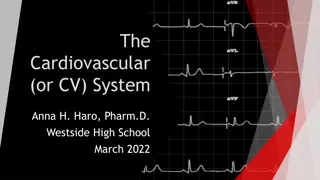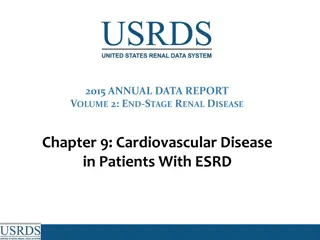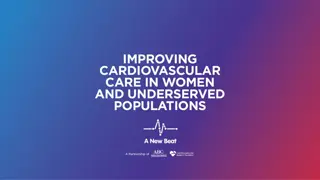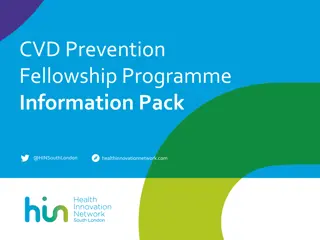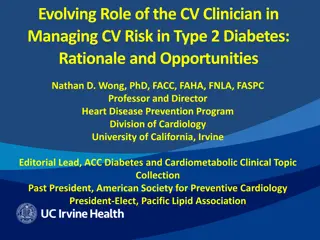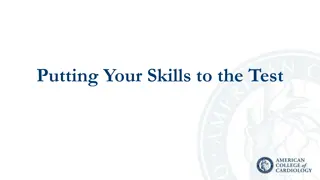Understanding the Cardiovascular System
Explore the closed system of the cardiovascular system where blood is contained within the heart and vessels. Learn about the total blood volume and its significance for overall health and function.
4 views • 21 slides
AHA Clinical Update Slide Set
The evidence-based science and clinical management of Cardiovascular-Kidney-Metabolic Syndrome (CKM) in this comprehensive slide set. Learn about the pathophysiological interactions, multi-organ dysfunction, and adverse cardiovascular outcomes associated with CKM.
0 views • 14 slides
Cardiovascular Disease in HIV
The increased risk of cardiovascular disease in people with HIV and specific strategies to treat it. This presentation discusses potential mechanisms, comorbidity gaps, and the impact of traditional risk factors. Explore the role of inflammation and immune dysfunction in atherosclerosis and vulnerab
0 views • 38 slides
Inflammation and Cholesterol Predicting Cardiovascular Events
This study explores how inflammation and cholesterol levels predict cardiovascular events among 13,970 statin-intolerant patients in the CLEAR Outcomes trial. Findings suggest residual inflammatory risk may be a stronger predictor than residual cholesterol risk for future events. The research analyz
0 views • 17 slides
Opioid Use Disorder Treatment Guidelines 2024
The February 2024 NYSDOH AIDS Institute Clinical Guidelines Program focuses on assisting clinicians in engaging with patients about opioid use disorder (OUD) treatment goals, emphasizing overdose prevention, providing updated information on available treatment options, and offering recommendations f
2 views • 24 slides
Insights from the REPRIEVE Trial for Managing Cardiovascular Risk in Patients with HIV
Cardiovascular disease is a growing concern in individuals living with HIV, despite advancements in treatment. The REPRIEVE Trial sheds light on the importance of assessing cardiovascular risk and implementing primary prevention measures in this population. Dr. Grinspoon's financial disclosures and
0 views • 35 slides
The REPRIEVE Trial: Developing Cardiovascular Disease Prevention Strategy for People Living with HIV
The REPRIEVE trial focuses on developing a cardiovascular disease prevention strategy for individuals living with HIV. It addresses the increased risk of CVD in this population, even with good viral suppression. The study evaluates the use of pitavastatin, a statin with anti-inflammatory properties,
1 views • 33 slides
Pediatric Cardiovascular Exam Overview
Explore the differences between pediatric and adult cardiovascular exams, highlighting key differences in disease patterns, examination approaches, and objectives. Learn about the importance of distinguishing between routine well-baby exams and evaluations of ill children, along with step-by-step gu
6 views • 24 slides
Understanding Lifestyle Medicine: A Holistic Approach to Health
Lifestyle medicine is a medical specialty focused on using evidence-based lifestyle interventions to treat chronic conditions like cardiovascular diseases, type 2 diabetes, and obesity. Clinicians trained in lifestyle medicine emphasize whole-person care through nutrition, physical activity, stress
10 views • 10 slides
CLEAR Outcomes Trial: Bempedoic Acid for Cardiovascular Prevention
The CLEAR Outcomes Trial investigated the effects of bempedoic acid, an ATP citrate lyase inhibitor, on cardiovascular outcomes in primary prevention patients. Results showed a reduction in cardiovascular events with bempedoic acid, particularly in patients intolerant to statins. Baseline characteri
0 views • 13 slides
Case-Based Triage Scenarios for New EMS Clinicians
These case-based scenarios offer an educational tool for new EMS clinicians to apply the National Guideline for Field Triage of Injured Patients. Developed with hypothetical system resources from diverse community settings, these scenarios prompt users to assess and make triage decisions based on va
0 views • 35 slides
Case-Based Triage Scenarios for New EMS Clinicians
These case-based scenarios are designed to train new EMS clinicians on applying the National Guideline for Field Triage of Injured Patients. Each scenario presents a patient for assessment and triage decision-making, considering varying EMS and trauma system resources. The goal is to enhance decisio
0 views • 35 slides
Effects of Exercise on the Cardiovascular System
Exploring the immediate and long-term effects of exercise on the cardiovascular system reveals the remarkable adaptations and responses the body undergoes. From short-term increases in heart rate and blood pressure to long-lasting changes in cardiac output, exercise plays a crucial role in enhancing
0 views • 13 slides
Impact of Diet on Cardiovascular Health
The impact of diet on the cardiovascular system is significant, with a high intake of LDL leading to clogged arteries and increased risk of Coronary Heart Disease. Regular exercise brings about positive changes in the cardiovascular system, enhancing heart function and oxygen delivery. Immediate ben
0 views • 7 slides
Understanding Delirium in Dementia for Clinicians
This learning module provides clinicians with insights into the relationship between delirium and dementia, how to distinguish between the two conditions, practical approaches to assessing delirium in dementia patients, treatment implications, and a structured method for delirium detection using cas
0 views • 29 slides
Understanding Longitudinal Integrated Clerkships in Medical Education
Longitudinal Integrated Clerkships (LICs) provide medical students with a unique learning experience where they engage in comprehensive patient care over time, develop ongoing relationships with clinicians, and meet core clinical competencies across multiple disciplines simultaneously. Contrasting w
0 views • 16 slides
Morphologic and Physiologic Connections in Blood Pressure Waveforms for Cardiovascular Event Prediction
This report discusses the morphologic and physiologic connections in continuous blood pressure waveforms and their association with incident cardiovascular events. The study aims to assess if changes in arterial elasticity contribute to predicting CVD events and explores additional measures derived
0 views • 30 slides
The Importance of Addressing Cardiovascular Disease in Maternal Health
Cardiovascular disease remains a significant contributor to maternal mortality in the UK, with maternal deaths from cardiac issues outnumbering those from other direct causes, except thrombosis. The prevalence of cardiovascular risk factors in pregnant women, combined with a lack of consideration fo
0 views • 22 slides
Strategies for Effective Clinician Partnership in Translational Science
Engage clinicians effectively by building relationships, addressing barriers, and highlighting benefits. Understand clinician perspectives and leverage established patient relationships to advance translational science research. Overcome participation barriers for both clinicians and patient-partici
0 views • 23 slides
Prevalence of Cardiovascular Disease in Adult ESRD Patients: 2016 Data Report
The data report examines the prevalence of cardiovascular diseases in adult End-Stage Renal Disease (ESRD) patients in 2016 by treatment modality and age. It includes information on various cardiovascular conditions such as atrial fibrillation, acute myocardial infarction, coronary artery disease, a
2 views • 25 slides
Interactions of Tobacco Smoke with Medications: Effects and Recommendations
Drug interactions with tobacco smoke can impact the pharmacokinetics and pharmacodynamics of various medications. Tobacco smoke constituents can induce enzymes that affect the metabolism of drugs, leading to altered therapeutic responses. For example, CYP1A2 enzyme induction by tobacco smoke can dec
0 views • 6 slides
Understanding Cardiovascular Changes in Pregnancy
This informative content discusses the normal physiological changes of the cardiovascular system in pregnancy, symptoms and signs of cardiovascular disease, the impact of pregnancy on cardiovascular health, and the management of cardiovascular issues during pregnancy, labor, and the postpartum perio
0 views • 28 slides
Guide: NSQHS Standards for Senior Clinicians
This guide provides an overview of the NSQHS Standards process to help senior clinicians prepare for Accreditation Survey. It includes checklists, questions, and tips on aligning current practices with the Standards. The NSQHS Standards drive safety and quality systems in Australian health care, wit
0 views • 9 slides
Understanding Cardiovascular Drugs: An Overview of Treatment Options
Explore the world of cardiovascular drugs, including antihypertensive, antianginal, heart failure, antiarrhythmic, diuretic, antithrombotic, and antihyperlipidemic medications. Dive into the mechanisms of action, clinical indications, and adverse effects of these drugs, gaining valuable insights int
0 views • 39 slides
Creating a Peer Support Program for Clinicians and Staff
A peer support service is being developed to provide emotional support to clinicians impacted by adverse events in patient care. The program aims to offer immediate, confidential, and voluntary access to peer support, serving as emotional first aid rather than therapy. Peer supporters play a crucial
0 views • 11 slides
Building an Accessibility Culture for Clinicians & Students with Disabilities
Imagine starting a new job at a clinic only to face accessibility challenges like blocked ramps and non-functional elevators. In this podcast episode, experts Dr. Suzi Baxter and Alena Morales discuss the importance of creating an inclusive environment for clinicians, students, and interns with disa
0 views • 9 slides
Evolution of Glucose-Lowering Therapies in Primary Care Settings
Cardiovascular effects of older glucose-lowering therapies and the history of cardiovascular outcome trials are discussed in this educational slide module. It outlines the timeline of treatment options from the discovery of insulin to the introduction of various medications. Evidence regarding the c
0 views • 29 slides
Investigating the Impact of Weekly Incretin on Cardiovascular Events in Diabetes
Individuals with type 2 diabetes have an increased risk of cardiovascular events compared to those without the condition. Research indicates that certain GLP-1 receptor agonists have shown promising results in reducing cardiovascular events in diabetic patients with specific HbA1c levels. However, t
0 views • 69 slides
Clinical Trial Results of Rivaroxaban in ACS Patients: ATLAS-ACS 2 Study
The ATLAS-ACS 2 study investigated the efficacy and safety of rivaroxaban in ACS patients post-index event. The primary endpoints included cardiovascular death, MI, and stroke, with significant reductions seen with rivaroxaban compared to placebo. Stent thrombosis was also reduced with rivaroxaban t
0 views • 10 slides
Creating a Supportive Community for Clinicians in Intellectual and Developmental Disabilities Care
In this initiative led by Vanderbilt University Medical Center, clinicians caring for adults with intellectual and developmental disabilities come together on Zoom to support each other and enhance care for their patients. Through a collaborative platform resembling Project ECHO, participants presen
0 views • 18 slides
GripTrack: Innovative Device for Monitoring Elderly Health
GripTrack is a portable grip strength monitoring device designed to track cardiovascular and musculoskeletal health in the elderly population. It aims to provide an accurate early warning system by assessing grip strength, which can indicate cognitive decline, cardiovascular health, and frailty synd
0 views • 14 slides
Understanding the Cardiovascular Effects of Air Pollution in Vulnerable Populations
This presentation discusses the significant cardiovascular effects of air pollution, particularly on vulnerable populations such as older adults, women, and Latinos. It highlights the environmental factors contributing to cardiovascular health disparities and emphasizes the nursing implications for
0 views • 13 slides
Comprehensive Guidelines on PrEP for HIV Prevention
These guidelines aim to increase awareness and knowledge of PrEP efficacy, assist clinicians in identifying candidates for PrEP, address barriers to access, and provide evidence-based recommendations for PrEP initiation, management, monitoring, and more. Key points include same-day initiation of PrE
0 views • 60 slides
Recognizing and Addressing Elder Abuse in Clinics: A Novel Tool for Clinicians
Abuse of the elderly is often overlooked in Indian society, leading to significant health impacts. Clinicians lack training in identifying abuse, hindering proper care. This article discusses the types of abuse, its impact on health, and provides a tool to help clinicians detect signs of abuse in el
0 views • 12 slides
Understanding the Cardiovascular System: Anatomy, Physiology, and Function
Explore the intricate workings of the cardiovascular system, encompassing the heart, blood vessels, and blood circulation. Learn the anatomy, physiology, and function of this vital system, including the roles of arteries, veins, capillaries, and red and blue blood. Understand how the cardiovascular
0 views • 23 slides
Cardiovascular Disease in End-Stage Renal Disease Patients: Data Analysis 2011-2013
Understanding the prevalence and causes of cardiovascular diseases in patients with End-Stage Renal Disease (ESRD) is crucial for effective management. This report analyzes data from 2011-2013, focusing on the causes of death in ESRD patients, prevalence of cardiovascular diseases by treatment modal
0 views • 18 slides
Insights on Cardiometabolic Risk Reduction and Diabetes Treatment in 2019
Cardiologists in 2019 must address the significant cardiovascular risks associated with diabetes mellitus. Dr. Keith C. Ferdinand highlights the increased rates of heart disease, stroke, and heart failure in patients with diabetes. Despite advancements, cardiovascular risk management remains subopti
0 views • 10 slides
Cardiovascular Disease Prevention Fellowship Programme Information Pack
The Cardiovascular Disease Prevention Fellowship Programme by Health Innovation Network offers a comprehensive 7-month program for healthcare professionals to enhance their skills in cardiovascular disease prevention. The program includes clinical webinars, improvement collaborative sessions, and qu
0 views • 14 slides
The Evolving Role of Cardiovascular Clinicians in Managing Type 2 Diabetes Risk
The role of cardiovascular clinicians in managing cardiovascular risk in patients with type 2 diabetes is evolving, with a growing emphasis on collaboration with multidisciplinary teams. Recognizing the potential benefits of certain diabetes medications on cardiovascular outcomes, clinicians are urg
0 views • 25 slides
Understanding PCSK9 Inhibitors for Cardiovascular Health
PCSK9 inhibitors are a novel class of medications that help lower LDL cholesterol levels, reducing the risk of cardiovascular events. This article covers their mechanism of action, patient groups benefiting from them, efficacy in LDL-C lowering, and safety considerations. Learn how PCSK9 inhibitors
0 views • 8 slides
